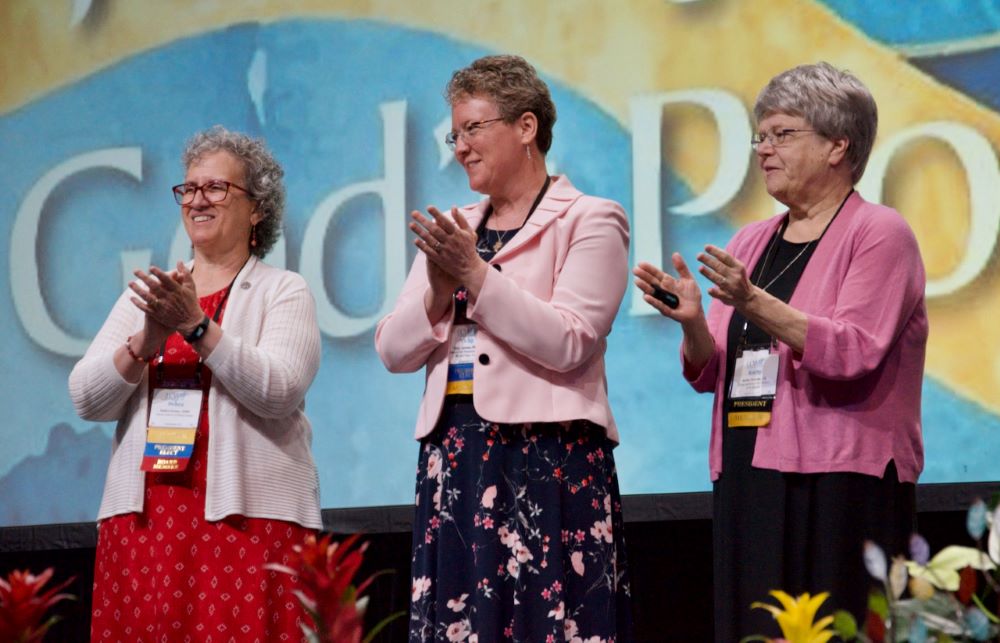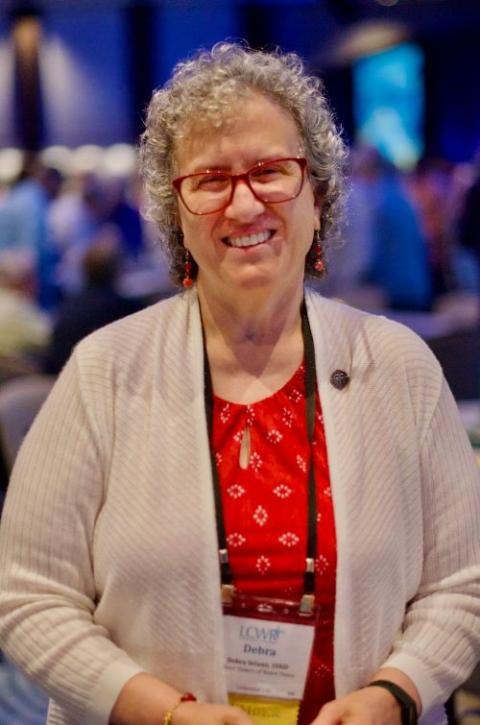
LCWR president-elect Sr. Debra Sciano, left, stands on the LCWR assembly stage with president Sr. Vicky Larson and past president Sr. Kathy Brazda in Atlanta Aug. 15. (GSR photo/Dan Stockman)
Debra Sciano was taught by Sinsinawa Dominican sisters in high school, but never wanted to enter religious life. She was going to be a lawyer.
But then a friend invited her to go with her on a vocation retreat with the School Sisters of Notre Dame. Sciano didn't even know what a vocation retreat was, but went anyway.
"I ended up in the School Sisters of Notre Dame and she ended up married with children!" Sciano said, laughing.
But not right away.
First, Sciano still planned to become a lawyer, specifically one who works with needy families. And then there was the matter of a boy she met at the retreat.
"We ended up dating afterward and went to senior prom together," Sciano said.
But she also met three School Sisters who made a big impression on her, and in 1977, at age 19, she entered the congregation.
On Aug. 15, Sciano, now 67, became president-elect of the Leadership Conference of Women Religious, which represents about two-thirds of the nearly 35,000 sisters in the United States. She joins Presentation Sr. Vicky Larson, president; and St. Joseph Sr. Kathy Brazda, past president.
After entering the congregation, Sciano eventually did become a lawyer, after earning a bachelor's degree in criminal justice from the University of Wisconsin-Milwaukee and her law degree from St. Thomas University in Miami. For 13 years she was a Wisconsin assistant district attorney, mainly representing children in need of protection and services, and has also worked as a family mediator. After joining congregational leadership in 2001, she served as an LCWR region chair and a national board member.
Global Sisters Report: How did you go from no interest in religious life to president-elect of LCWR?
Sciano: I never expected in a million years to find myself in this position. I always wanted, since I was a child, to be a lawyer.

School Sisters of Notre Dame Sr. Debra Sciano is seen at the LCWR assembly in Atlanta Aug. 15 shortly after becoming president-elect. (GSR photo/Dan Stockman)
Once I joined, I asked the community to be a lawyer. I was a community organizer first, then went to law school. After the first few years in the congregation, they began asking me about considering leadership, but I said, "No, I love what I'm doing."
But I was getting a little burned out with the cases I was dealing with. So finally I let my defenses down a bit and kept my name in.
Family court can be an endless river of pain, with children often at the center of cases involving abuse, neglect and worse. How did you keep doing it as long as you did?
It was really the people I worked with. The lawyers, the social workers, teachers, hospital personnel — we were all there for the same reason: We cared about the children we were working with.
But with the worst of the worst cases, it was hard to go home at night.
I also had to balance things. Community and prayer are so essential. Learning to take that time to be centered, having a spiritual director, getting exercise. I was probably more balanced then than I am now with being in leadership.
Things like hobbies help. I love cooking — I'm Italian — and I love to be in the kitchen. I'm a lover of sports, especially baseball and the Milwaukee Brewers.
But it's one of those things that never quite leaves a person. To this day I remember those children. It just doesn't leave you.
So aside from a certain boy at the vocation retreat, clearly there was something else that attracted you to the School Sisters.
I think it was their spirit — our mission is about bringing people together. One way for us to do that has been education. I never was a teacher in formal education, and I was never taught by School Sisters of Notre Dame, but there's different ways of bringing people together.
Also, they're international in scope, and that drew me in, as well.
What is your view of the state of religious life in the United States today and going forward?
Clearly, we don't have as many new members as we'd like, but internationally there are a lot of new vocations around the world. And we have really grown in sharing our mission with others: We have about 630 sisters in the Central Pacific Province, and over 300 associates. And even beyond that, there are just so many of those who minister with us. We see the mission carried out by so many others.
I don't feel we're dying out at all, I feel it's a new birth, a new way of living out the Gospel.
Advertisement
It's like with our charism: We want it to continue, but it's also the letting go of the way we've always done it. We also want to somehow combine the gifts and contributions of younger generations and different cultures.
Traditions can be wonderful. I'm from an Italian family, so we have a lot of traditions. But even those are shifting. The newer generations do things differently.
And what do you see for the next three years as you serve in the presidency?
It will be an interesting time for me to go to the bishop's meeting and go to Rome — I'm going in with a sense of learning. We've had so much divisiveness in so many ways, even among sisters, we used to [have] some competition among congregations, and thankfully that has changed over the years.
That's one of the reasons I love LCWR, there's so much collaboration across congregations. There's lots of hopefulness.




